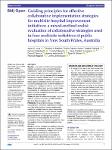Guiding principles for effective collaborative implementation strategies for multisite hospital improvement initiatives: a mixed-method realist evaluation of collaborative strategies used in four multisite initiatives at public hospitals in New South Wales, Australia
| dc.contributor.author | Long, JC | |
| dc.contributor.author | Sarkies, MN | |
| dc.contributor.author | Francis-Auton, E | |
| dc.contributor.author | Roberts, N | |
| dc.contributor.author | Hardwick, R | |
| dc.contributor.author | Nguyen, HM | |
| dc.contributor.author | Levesque, J-F | |
| dc.contributor.author | Watson, DE | |
| dc.contributor.author | Westbrook, J | |
| dc.contributor.author | Hibbert, PD | |
| dc.contributor.author | Rapport, F | |
| dc.contributor.author | Braithwaite, J | |
| dc.date.accessioned | 2023-08-01T15:11:14Z | |
| dc.date.available | 2023-08-01T15:11:14Z | |
| dc.date.issued | 2023-06 | |
| dc.identifier.issn | 2044-6055 | |
| dc.identifier.issn | 2044-6055 | |
| dc.identifier.other | e070799 | |
| dc.identifier.uri | https://pearl.plymouth.ac.uk/handle/10026.1/21124 | |
| dc.description.abstract |
Objective Large-scale, multisite hospital improvement initiatives can advance high-quality care for patients. Implementation support is key to adoption of change in this context. Strategies that foster collaboration within local teams, across sites and between initiative developers and users are important. However not all implementation strategies are successful in all settings, sometimes realising poor or unintended outcomes. Our objective here is to develop guiding principles for effective collaborative implementation strategies for multi-site hospital initiatives. Design Mixed-method realist evaluation. Realist studies aim to examine the underlying theories that explain differing outcomes, identifying mechanisms and contextual factors that may trigger them. Setting We report on collaborative strategies used in four multi-site initiatives conducted in all public hospitals in New South Wales, Australia (n>100). Participants Using an iterative process, information was gathered on collaborative implementation strategies used, then initial programme theories hypothesised to underlie the strategies’ outcomes were surfaced using a realist dialogic approach. A realist interview schedule was developed to elicit evidence for the posited initial programme theories. Fourteen participants from 20 key informants invited participated. Interviews were conducted via Zoom, transcribed and analysed. From these data, guiding principles of fostering collaboration were developed. Results Six guiding principles were distilled: (1) structure opportunities for collaboration across sites; (2) facilitate meetings to foster learning and problem-solving across sites; (3) broker useful long-term relationships; (4) enable support agencies to assist implementers by giving legitimacy to their efforts in the eyes of senior management; (5) consider investment in collaboration as effective well beyond the current projects; (6) promote a shared vision and build momentum for change by ensuring inclusive networks where everyone has a voice. Conclusion Structuring and supporting collaboration in large-scale initiatives is a powerful implementation strategy if contexts described in the guiding principles are present. | |
| dc.format.extent | e070799-e070799 | |
| dc.format.medium | Electronic | |
| dc.language | en | |
| dc.publisher | BMJ | |
| dc.subject | change management | |
| dc.subject | quality in health care | |
| dc.subject | health & safety | |
| dc.title | Guiding principles for effective collaborative implementation strategies for multisite hospital improvement initiatives: a mixed-method realist evaluation of collaborative strategies used in four multisite initiatives at public hospitals in New South Wales, Australia | |
| dc.type | journal-article | |
| dc.type | Article | |
| plymouth.author-url | https://www.ncbi.nlm.nih.gov/pubmed/37286318 | |
| plymouth.issue | 6 | |
| plymouth.volume | 13 | |
| plymouth.publisher-url | http://dx.doi.org/10.1136/bmjopen-2022-070799 | |
| plymouth.publication-status | Published | |
| plymouth.journal | BMJ Open | |
| dc.identifier.doi | 10.1136/bmjopen-2022-070799 | |
| plymouth.organisational-group | |Plymouth | |
| plymouth.organisational-group | |Plymouth|Research Groups | |
| plymouth.organisational-group | |Plymouth|Faculty of Health | |
| plymouth.organisational-group | |Plymouth|Users by role | |
| plymouth.organisational-group | |Plymouth|Users by role|Academics | |
| plymouth.organisational-group | |Plymouth|Faculty of Health|Peninsula Medical School | |
| plymouth.organisational-group | |Plymouth|Research Groups|FoH - Community and Primary Care | |
| plymouth.organisational-group | |Plymouth|Research Groups|Plymouth Institute of Health and Care Research (PIHR) | |
| dc.publisher.place | England | |
| dcterms.dateAccepted | 2023-05-22 | |
| dc.date.updated | 2023-08-01T15:10:40Z | |
| dc.rights.embargodate | 2023-8-2 | |
| dc.identifier.eissn | 2044-6055 | |
| dc.rights.embargoperiod | forever | |
| rioxxterms.versionofrecord | 10.1136/bmjopen-2022-070799 |


